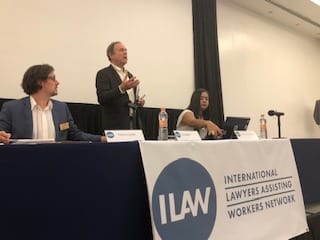
Nov 5, 2019
“There is a human rights crisis around the world—that’s why we are intensifying our work in recognizing the role labor plays in holding government’s accountable and promoting dignity and equality at work,” said Sandra Coliver from the Open Society Foundation, opening the second day of the International Lawyers Assisting Workers (ILAW) Conference in Mexico City.
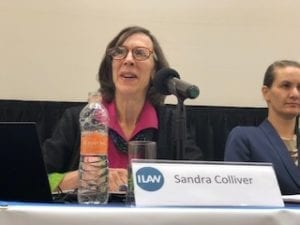
Labor is key to addressing the global crisis in human rights—Sandra Coliver, OSF. Credit: Solidarity Center/Tula Connell
Coliver moderated a panel plenary with representatives from the American Bar Association, the Business and Human Rights Resource Center (BHRRC), Human Rights Watch and the International Commission of Jurists (ICJ) who discussed how their efforts as independent monitors and lawyers provide a key tool for worker rights advocates around the world.
More than 100 worker rights lawyers from around the world are discussing strategies to facilitate innovative litigation, help spread the adoption of pro-worker legislation and defeat anti-worker laws at the first ILAW conference. Participants yesterday discussed identified common challenges, share successes, plan strategic partnerships and more.
Key Allies: Independent Legal & Human Rights Groups
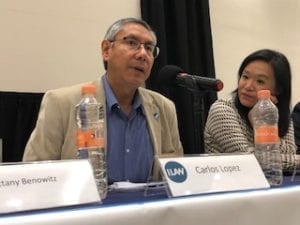
Carlos Lopez says ICJ offers an international lens on human rights abuses. Credit: Solidarity Center/Tula Connell
In Zimbabwe, where ongoing protests against the nation’s economic meltdown have been met with death threats and a sustained government crackdown on union leaders and other civil society members, the ICJ this year documented 800 human rights violations, murders and hundreds of arrests and detentions, many included trade unionists.
ICJ created an emergency fund to provide protection for human rights violations in Zimbabwe, and relocated to safe places people whose houses were targeted and other assistance, said Carlos Lopez at ICJ.
The organization’s fact-finding mission with South African lawyers and others resulted in magistrate courts, made presentations before authorities and prepared a report—and in doing so, “signaled a strong message to labor lawyers activists that there is an international eye on what’s happening—solidarity,” he said.
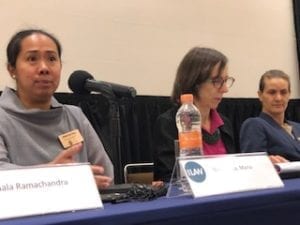
BHRRC investigates up to 100 worker right violations a year, says Bobbi Sta. Maria. Credit: Solidarity Center/Tula Connell
At BHRRC, the organization investigates up to 500 allegations of worker rights and human rights abuses each year and seeks to get companies to respond to the allegations, said Bobbie Sta. Maria.
“We create a public record of allegations against companies, work with unions, using information from the media and push the information out to investors, governments, non-governmental organizations, academics, companies,” and more, she said.
The ABA’s involvement in addressing worker rights and human rights abuses results in “fewer violations and shorter periods of confinement and creates documentation” that the ABA takes to brands to engage local suppliers, said Brittany Benowitz at the ABA.
“Having a bar association as outside observer helps in the larger effort” of achieving worker rights, she said.
ILAW Going Forward
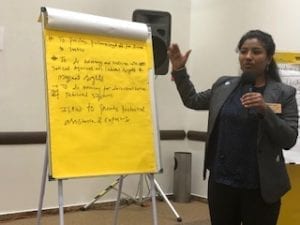 During regional breakouts—Africa, Asia, Europe and Latin America—participants built on discussions over the past day and a half to map out recommendations for ILAW and its members to further craft a network that achieves its founding goals: a global hub for worker rights lawyers to facilitate innovative litigation, help spread the adoption of pro-worker legislation and defeat anti-worker laws.
During regional breakouts—Africa, Asia, Europe and Latin America—participants built on discussions over the past day and a half to map out recommendations for ILAW and its members to further craft a network that achieves its founding goals: a global hub for worker rights lawyers to facilitate innovative litigation, help spread the adoption of pro-worker legislation and defeat anti-worker laws.
Common themes emerged: ILAW members said the network should go deeper in labor law reform and legislation and policy changes, engage in more public statements and advocacy and include migrant worker rights throughout all its advocacy.
The ILAW network should provide technical assistance and support so members can “share information on the migrant worker recruitment system and migration policies to enable unions and other stakeholders in the destination country to assist migrant workers,” said Sabnam Awal from the People’s Forum on Human Rights in Nepal.
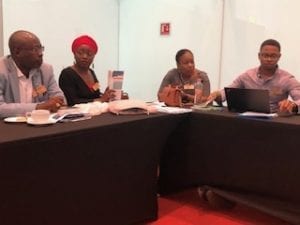
ILAW Conference participants took part in regional breakouts to map next steps. Credit: Solidarity Center/Tula Connell
Members also frequently urged ILAW to go further in helping them address gender equality issues and network around strategies to move ratification of a new global treaty ending gender-based violence at work (International Labor Organization/ILO Convention 190).
ILAW should explore “how to encourage unions to provide an equal and level playing ground free from discrimination for both men and women,” said Kaizala Tembo, from the Labor Institute of Zambia.
Many of the resources members seek are available at the ILAW website, said ILAW Board Chair Jeff Vogt, who reviewed its features in an afternoon plenary in which members shared their priorities for ILAW. The ILAW website is available in seven languages and includes a library of resources, such as legal cases submitted by members for inclusion. ILAW members may join any of the dozens of discussion groups which are organized thematically, such as migrant worker discussion group and regionally.
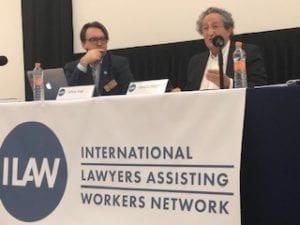
Horacio Meguira led a discussion on worker rights and the ILO. Credit: Solidarity Center/Tula Connell
Vogt, Solidarity Center Rule of Law director, also noted that an urgent action feature will shortly be live that will enable members to react quickly with an online petition.
In the final conference plenary, Horacio Meguira from the Argentina Independent Workers union, shared a history of the ILO and engaged participants in a discussion of how worker rights lawyers can address the recent shift in the organization—comprised of representatives of workers, employers and governments—toward favoring corporate and state policies that endanger worker rights.
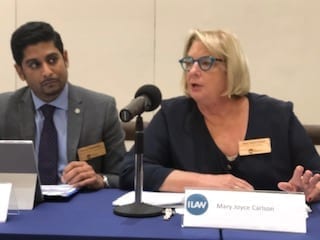
Nov 4, 2019
The ability of workers to freely form unions is such a fundamental human right that the United Nations (UN) holds countries accountable for violating those rights, according to Lance Compa, senior lecturer in labor law at Cornell University.
“Even countries that have not ratified ILO 87”—the International Labor Organization standard covering freedom of association—“are subject to it because it’s a basic right under the UN charter,” he said.
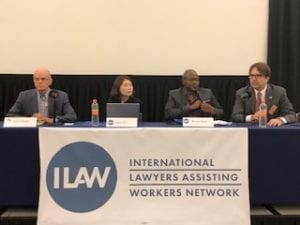
Lance Compa, Dayhe Park, Benson Upah and Jeff Vogt open the afternoon session on freedom of association. Credit: Solidarity Center/Tula Connell
Compa opened the afternoon panel plenary on freedom of association at the International Lawyers Assisting Workers (ILAW) conference in Mexico City, where worker rights lawyers are discussing strategies to facilitate innovative litigation, help spread the adoption of pro-worker legislation and defeat anti-worker laws. The two-day conference in Mexico City brings together more than 100 worker rights lawyers from around the world.
Compa pointed out that the concept of freedom of association is much broader than the ability to form unions, and cited examples of workers in the United States who are exercising those rights through worker associations comprised primarily of migrant workers, walkouts at nonunionized corporations like Google, and the transnational fast food worker fight for better wages.
Benson Upah at the Nigeria Labor Congress and Dayhe Park from the Korea Confederation of Trade Unions joined Compa in leading a wide-ranging discussion with participants who shared concerns about the lack of judicial knowledge of ILO standards on labor rights and the need to educate workers about their rights.
“Unions need to embark on internal governance structural reforms, such as transparency,” Upah said. He also suggested the ILO should assist labor rights advocates in bringing companies to justice for committing offenses in one country and then moving operations to another so they will not face legal action.”
Upah also stressed another key tool to achieve worker justice: “the importance of mass action.”
Building on Success
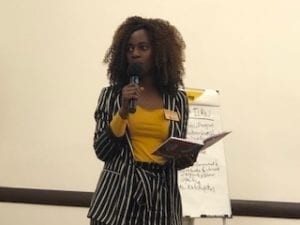
Maureen Kalume chadi from KUDHEIHA shares discussions on migrant worker rights. Credit: Solidarity Center/Tula Connell
“Capital can move freely, but where does it move?” Where it can pay workers the least, said Maureen Kalume chadi from the Kenya Union of Domestic, Hotels, Educational Institutions, Hospitals and Allied Workers (KUDHEIHA), sharing insights from an earlier roundtable discussion on achieving justice for migrant workers. The roundtable was among six that participants reported on during another afternoon plenary, where they also suggested strategic next steps for ILAW to take in the coming year.
Discussing how migrant workers are excluded from national labor laws and so denied access to justice, and how unscrupulous labor recruitment agencies take advantage of migrant workers, the group also shared success stories from India and Thailand. In Thailand, for instance, worker rights attorneys assisted migrant farm workers from Myanmar in obtaining justice after they were imprisoned for reporting abuses.
Participants in the employment discrimination roundtable shared their discussions on the intersectional concept of discrimination and how religion, ethnicity and other factors are connected with gender discrimination, points that show “the need to bolster our expertise on it, and recognize it from the outset,” said Solidarity Center Senior Gender Specialist Robin Runge.
“Isolating forms of discrimination is not effective,” she said.
The roundtable on discrimination also discussed the extent to which gender inequality is a widespread global issue, and how equal pay is not limited to unequal paychecks between women and men—for example, women may be blocked from securing higher paying jobs.
With the June passage of ILO 190 on ending violence in the workplace and the need for governments to ratify the standard, the group recommended an ILAW forum to enable members to share strategies on its implementation in their countries.
Participants in the “fissured employment relationship” roundtable shared their conversations on the need for a broad definition of worker and employer to address the growing number of “platform” companies like Uber claiming they are not employers and asking for exemptions from labor laws that protect workers.
Participants also reported on their roundtable discussions on the global supply chain, occupational safety and health and the informal economy.
Emphasis on Democracy
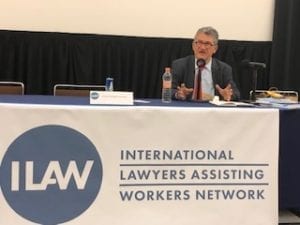
Arturo Alcade discussed the strategies that led to Mexico’s new labor law reform. Credit: Solidarity Center/Tula Connell
Building on earlier discussions in the conference on Mexico’s recent labor law reforms, Arturo Alcade, a prominent labor lawyer in Mexico, discussed during a lunchtime plenary how worker rights advocates for years championed the reforms now coming to fruition.
By filing complaints with the ILO on labor law violations that put worker rights abuses under international scrutiny and by working across borders with unions to hold corporations like NIKE accountable for worker rights violations, Alcalde says labor law reform “is now becoming institutionalized” in Mexico.
Follow Solidarity Center on Twitter and Facebook for updates throughout the conference.
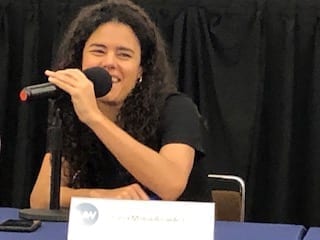
Nov 4, 2019
From Chile to Zimbabwe, the past year has been one of protest and struggle as unions, workers and citizens are standing up against economies that do not work for working people, said Solidarity Rule of Law Director Jeff Vogt, opening the first International Lawyers Assisting Workers (ILAW) Conference.
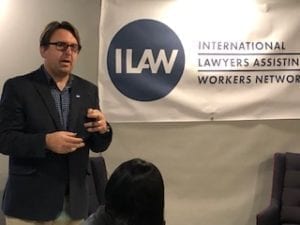
“We see opportunities now to deepen democracy”—Jeff Vogt. Credit: Solidarity Center/Tula Connell
“We see the opportunities now to deepen democracy,” said Vogt, ILAW Board Chair. “We are making progress as unions and as lawyers for unions. That is what I want us to remember and share.”
More than 100 worker rights lawyers from around the world are in Mexico City for the two-day conference to share successes and seek strategies for overcoming obstacles to achieving worker justice on the job. Formed last year, ILAW has nearly 400 members from 50 countries.
Describing Mexico’s labor law reforms as “the most important in the last 100 years,” Mexico Labor Secretary Luisa Alcalde detailed during the opening plenary how the new law will reform the employer protection contracts that shut out workers’ voice in their unions. The contracts, which now comprise 80 percent to 85 percent of all workplace contracts, will undergo a process in which workers are asked to vote on whether the contracts represent them. Going forward, the law stipulates all new agreements are fully understood and accepted by union members.
Ultimately, Alcalde said, Mexico’s new labor law does not “just change articles and sections but relies on change of culture, a change of relationship between employers and unions” that emphasizes democratic process and accountability.
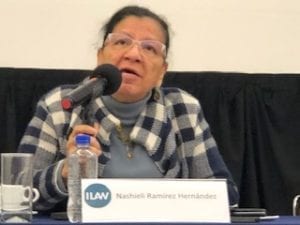
“Labor rights are human rights”—Nashieli Ramirez Credit: Solidarity Center/Tula Connell
Also speaking at the plenary, Nasshieli Ramírez, president of the Human Rights Commission of Mexico City, emphasized that Mexico’s labor law reforms are “sending out a clear signal against impunity as far as labor rights are involved.”
The ILAW Network is important because labor rights issues cross borders and require coordination among worker rights lawyers to develop strategies, Ramírez said.
“Only by looking at structural conditions that cause inequality of labor rights” among the disabled, indigenous and other marginalized workers “that’s when we need to speak about progressive right of labor rights. Labor rights are human rights.”
Tools for Worker Rights
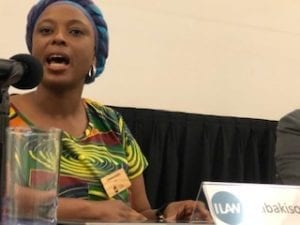
Libakis Matlho shares details on a new contract in Lesotho improving rights to violence free workplace for 10,000 garment workers. Credit: Solidarity Center/Tula Connell
Libakiso Matlho, national director for the Women and Law in Southern Africa Research and Education Trust (WLSA)-Lesotho, opened the first panel plenary by describing a new groundbreaking agreement to end sexual harassment and other forms of gender-based violence at work in five Lesotho garment factories.
The program, established by two negotiated and enforceable agreements, will cover 10,000 Lesotho garment workers in factories that produce jeans and knitwear for the global market.
Lesotho-based unions, WSLA and the Federation of Women Lawyers in Lesotho (FIDA), major fashion brands and international worker rights organizations, including the Solidarity Center, negotiated with the factory owner, Nien Hsing Textiles, to mandate education and awareness trainings for all employees and managers, an independent reporting and monitoring system and remedies for abusive behavior.
In Mexico, where one in 10 migrant workers pay labor recruiters for jobs that don’t exist and many are charged exploitative fees, a new digital platform enables migrant workers to review labor recruiters, increasing transparency and creating a digital community of workers to achieve justice, said Jimena Monjaras from Centro de los Derechos del Migrante.
The platform can be transferred to other countries and will serve to “correct the imbalance of power that exists now between employers and employees,” she said.
The morning session ended with a series of roundtables covering global supply chains, employment discrimination, fissured employment relationships, migrant worker rights, the informal economy and occupational safety and health.
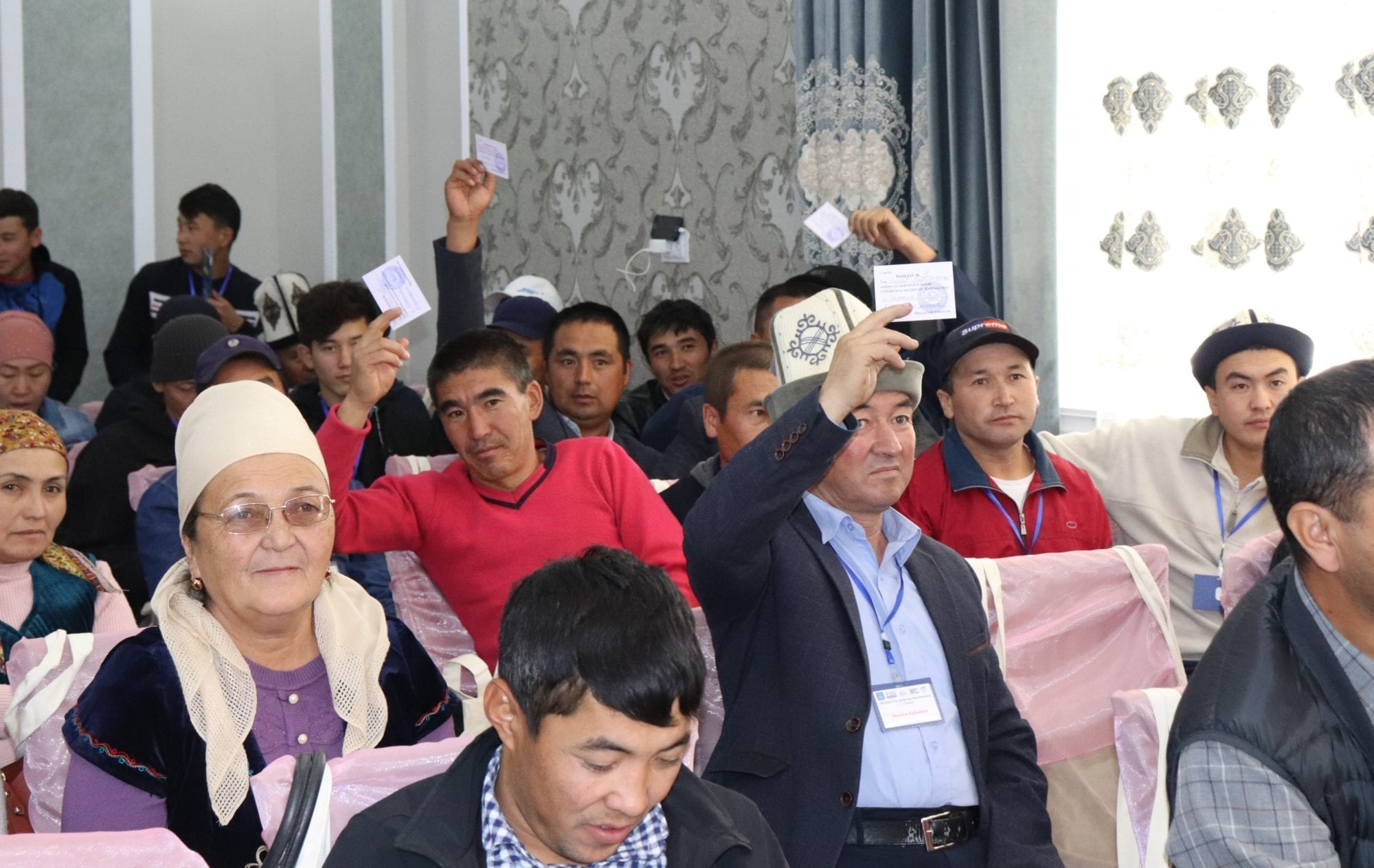
Nov 4, 2019
Since the start of 2019, more than 2,000 migrant workers from Kyrgyzstan have joined together to protect their rights abroad through the new Migrant Workers’ Union. On October 17, more than 100 union delegates came together in the town of Isfana, Kyrgyzstan, for the union’s founding congress.
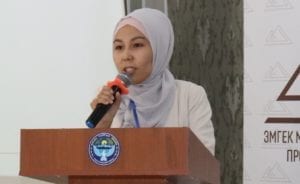
Newly elected deputy chairwoman of the Migrant Workers’ Union, Batyrova Kanykey, addresses more than 100 delegates at their founding congress. Credit: Elena Rubtsova
The congress marks a crucial step as the union establishes itself as a leading support system for migrant workers from Kyrgyzstan. Delegates cast their votes to elect union leadership and planned activities and outreach to more workers in the coming year.
Workers from across three regions of western Kyrgyzstan—Batken, Jalal-Abad and Osh—worked together to build this new organization, with support from the Solidarity Center and Insan-Leilek, a local foundation that provided assistance to migrant workers from Kyrgyzstan over the last five years. The union has also garnered support from the Germany-based Friedrich-Ebert-Stiftung and Caritas France.
Insan-Leilek celebrated the milestone with a video in Russian.
Protecting Workers Abroad
Migrant workers from Kyrgyzstan, and from around the world, often face discrimination, exploitation and unsafe working conditions when they arrive in their destination countries. In Russia, a common destination for Kyrgyz migrants, workers have reported working without official contracts or having their wages stolen, with few opportunities to stand up for their rights and hold their employers accountable. Kyrgyz workers also travel to Kazakhstan, Germany and elsewhere for work. Many stay year-round, while others travel back and forth each year for seasonal jobs.
“A large number of labor migrants are subjected to exploitation and violation of their rights by employers, employment agencies and other intermediaries,” says Gulnara Derbisheva, a human rights activist in Kyrgyzstan and the leader of Insan-Leilek. “They face abuse of authority by the police and other officials. In some cases, labor migrants are victims of trafficking and forced labor.”
Since 2015, the Solidarity Center and Insan-Leilek have held pre-departure trainings for working women and men who are preparing to migrate abroad, most of them to Russia. Through these trainings, thousands of migrants have learned about their rights and the protections they have under Russian labor law. Armed with this knowledge, many workers have started exercising their rights the moment they arrive at their new jobs.
Many migrants have used their knowledge of Russian labor law to negotiate higher wages and overtime pay. Others have worked with their employers to ensure they have fully signed contracts that specify their working conditions and document their ability to work in the country. Migrant women have also learned how to protect their rights, including avoiding human traffickers and reporting workplace harassment.
The Solidarity Center also provides training participants with contact information for local legal support in their destination countries. Through hotlines and free consultations, workers can seek legal help if or when they encounter issues on the job, such as wage theft and harassment.
The Solidarity Center’s pre-departure trainings have also shown migrants how they can join trade unions to further protect their rights, even when they are working abroad. As a result, workers decided they should create their own union so they could tailor it to support Kyrgyz migrants.
Migrant Workers Organizing for Justice
The creation of the Migrant Workers’ Union, its members say, is not just timely but also necessary to protect their rights at a time when more than one-fifth of Kyrgyz citizens are living and working abroad.
Gulzat, a delegate at the congress from the village of Boz-Adyr in the Batken region, first heard about the union at a training session the Solidarity Center and Insan-Leilek held in her village earlier in 2019. “I learned many important things about my labor rights and how they could be protected,” she says. “It was then that I decided to join the Migrant Workers’ Union because I am going back to work in Russia.”
Gulzat first went to work in Russia in 2010, where she experienced wage theft firsthand. “I became a dishwasher in a Moscow cafe and was a victim of fraud when I was left without a salary,” she explains. “I didn’t know where to turn for help, but now I know.”
The Migrant Workers’ Union currently has 2,150 members. But the union’s protections extend beyond just its members. Migrant workers from Kyrgyzstan rely on decent wages not only for themselves but also to support their families back home. Migrant workers from Kyrgyzstan remitted an estimated $2.48 billion in 2018, about 34 percent of the country’s gross domestic product. Since 2017, Kyrgyzstan has been the most remittance-dependent country in the world, and remittances are particularly important in its western regions like Batken. As migrant workers learn to defend their rights abroad, they also ensure their families in Kyrgyzstan can have more economic security and access more opportunities at home.
“Everybody needs their union,” says Gulzat. “Especially migrants.”
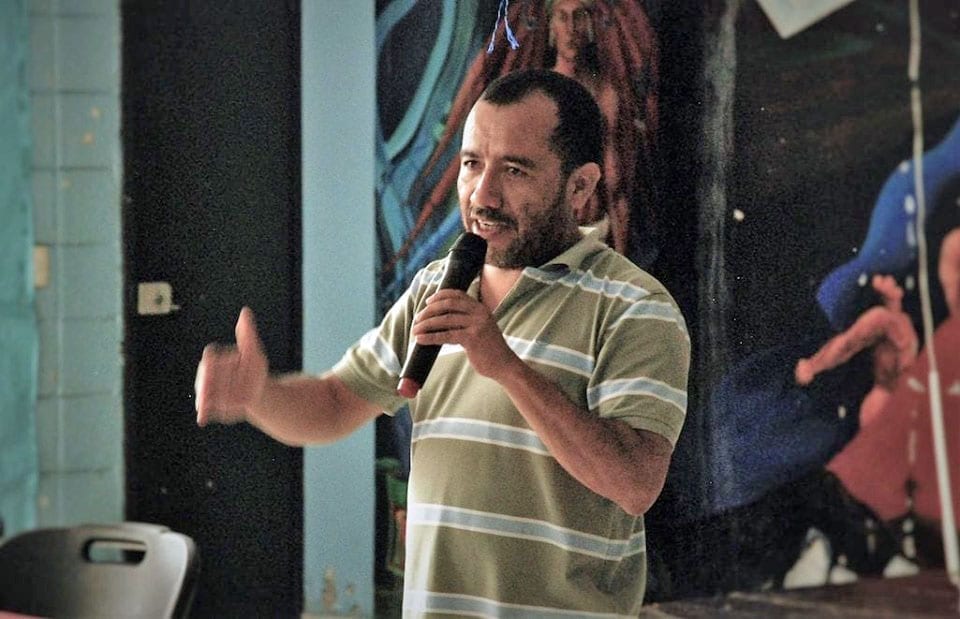
Oct 31, 2019
Jaime Atilio Rodríguez, a union leader and human rights activist in Honduras, was found alive yesterday after being kidnapped and apparently tortured.
Rodríguez, former president of the Union of Middle School Teachers (COPEMH), disappeared October 28 on the way to the bus in Tegucigalpa’s historic center, according to the Committee of Relatives of Disappeared Detainees in Honduras (COFADEH).
He was rescued after being bound and dumped near the Choluteca River, his neck slashed. He was treated and released yesterday from the hospital.
“They cut his throat, kidnapped him and threw him into the river,” said Rodriguez’ wife Martha de Rodríguez, who spoke with COFADEH.
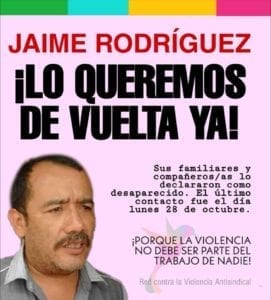 According to the Network Against Anti-Union Violence in Honduras, which tracks attacks on worker rights defenders, including union members and leaders, Rodríguez could have been targeted because of his activism as a land rights defender, his stance against electoral fraud, his recent opposition to proposed government privatization of essential public services, or some combination of the three. Tens of thousands of people have taken part in protests since April, when the government announced deep cuts to education and health services.
According to the Network Against Anti-Union Violence in Honduras, which tracks attacks on worker rights defenders, including union members and leaders, Rodríguez could have been targeted because of his activism as a land rights defender, his stance against electoral fraud, his recent opposition to proposed government privatization of essential public services, or some combination of the three. Tens of thousands of people have taken part in protests since April, when the government announced deep cuts to education and health services.
Spending on education and culture has dropped from 33 percent of the national budget to 20 percent over the past decade, with wages and infrastructure spending frozen. Some 40 percent of emergency rooms have inadequate medical coverage, according to the Honduras National Commission for Human Rights. Educators and health care workers say privatizing health and education systems will further decrease services and lead to layoffs.
The assault on Rodríguez also was meant to send a signal to others engaged in social protests, according to the Network, which says members of some of the country’s teacher unions have been harassed and intimidated for their involvement in the protests, with the president of another teacher union repeatedly threatened and nearly kidnapped. The Network is a Solidarity Center partner.
The teacher unions are members of the Platform for the Defense of Health and Public Education, a coalition of union and community organizations, which led the protests this past spring against cuts to public services. Security forces repeatedly responded by firing at protesters with live ammunition and tear gas.
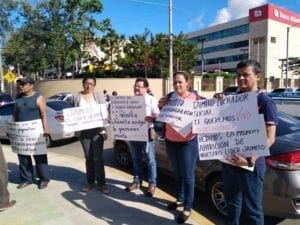
Teachers demanded Rodríguez’s safe return in protest downtown. Credit: Network Against Anti-Union Violence
Immediately following his disappearance, Rodríguez’s colleagues at COFADEH protested in downtown Tegucigalpa with signs demanding his safe return.
Edwin Hernández, a leader of a teachers union (Colpedagogosh), also active in the Platform for the Defense of Health and Public Education, took part in protest by teacher union activists demanding Jaime’s return.
“We are here demonstrating before our society so that society realizes what is happening to our friend Jaime, who is so valuable to the popular struggles in our country,” he said.
From his hospital bed, his throat visibly cut, Rodríguez agreed with a colleague who told him, “We won’t step back,” adding, “Onward!”
In 2012, the AFL-CIO and 26 Honduran unions and civil society organizations filed a complaint under the labor chapter of Central American Free Trade Agreement (CAFTA). The complaint, filed with the U.S. Department of Labor’s Office of Trade and Labor Affairs, alleges the Honduran government failed to enforce worker rights under its labor laws. In an October 2018 report, the U.S. Trade and Labor Affairs office said Honduras had made no progress on any of the emblematic cases since 2012.
In a recent letter to the U.S. Labor Department and U.S. Trade Representative, several members of Congress expressed “deep concern” regarding Honduras’s “continued violation” of CAFTA’s labor chapter, and noted that despite some progress, Honduras “continues to commit serious violations of the labor chapter on a regular basis.”




 During regional breakouts—Africa, Asia, Europe and Latin America—participants built on discussions over the past day and a half to map out recommendations for ILAW and its members to further craft a network that achieves its founding goals: a global hub for worker rights lawyers to facilitate innovative litigation, help spread the adoption of pro-worker legislation and defeat anti-worker laws.
During regional breakouts—Africa, Asia, Europe and Latin America—participants built on discussions over the past day and a half to map out recommendations for ILAW and its members to further craft a network that achieves its founding goals: a global hub for worker rights lawyers to facilitate innovative litigation, help spread the adoption of pro-worker legislation and defeat anti-worker laws.













 According to the Network Against Anti-Union Violence in Honduras, which tracks attacks on worker rights defenders, including union members and leaders, Rodríguez could have been targeted because of his activism as a land rights defender, his stance against electoral fraud, his recent opposition to proposed government privatization of essential public services, or some combination of the three. Tens of thousands of people
According to the Network Against Anti-Union Violence in Honduras, which tracks attacks on worker rights defenders, including union members and leaders, Rodríguez could have been targeted because of his activism as a land rights defender, his stance against electoral fraud, his recent opposition to proposed government privatization of essential public services, or some combination of the three. Tens of thousands of people 